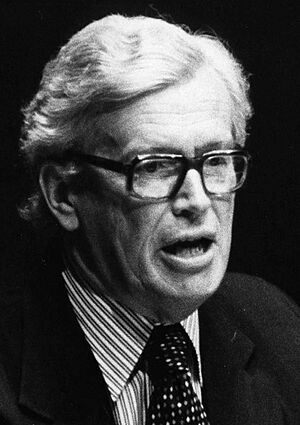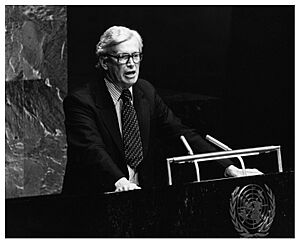Brian Talboys facts for kids
Quick facts for kids
Sir Brian Talboys
|
|
|---|---|

Talboys in 1980
|
|
| 7th Deputy Prime Minister of New Zealand | |
| In office 12 December 1975 – 4 March 1981 |
|
| Prime Minister | Robert Muldoon |
| Preceded by | Bob Tizard |
| Succeeded by | Duncan MacIntyre |
| 18th Minister of Foreign Affairs | |
| In office 12 December 1975 – 11 December 1981 |
|
| Prime Minister | Robert Muldoon |
| Preceded by | Bill Rowling |
| Succeeded by | Warren Cooper |
| 1st Minister of Trade and Industry | |
| In office 24 October 1972 – 8 December 1972 |
|
| Prime Minister | Jack Marshall |
| Succeeded by | Warren Freer |
| 24th Minister of Industries and Commerce | |
| In office 9 February 1972 – 24 October 1972 |
|
| Prime Minister | Jack Marshall |
| Preceded by | Norman Shelton |
| 29th Minister of Education | |
| In office 22 December 1969 – 9 February 1972 |
|
| Prime Minister | Keith Holyoake |
| Preceded by | Arthur Kinsella |
| Succeeded by | Lorrie Pickering |
| 18th Minister of Agriculture | |
| In office 24 January 1962 – 22 December 1969 |
|
| Prime Minister | Keith Holyoake |
| Preceded by | Thomas Hayman |
| Succeeded by | Douglas Carter |
| Member of the New Zealand Parliament for Wallace |
|
| In office 30 November 1957 – 28 November 1981 |
|
| Preceded by | Tom Macdonald |
| Succeeded by | Derek Angus |
| Personal details | |
| Born | 7 June 1921 Wanganui, New Zealand |
| Died | 3 June 2012 (aged 90) Invercargill, New Zealand |
| Political party | National |
| Signature | |
Sir Brian Edward Talboys (7 June 1921 – 3 June 2012) was an important New Zealand politician. He served as the seventh Deputy Prime Minister of New Zealand under Robert Muldoon. He was known for his calm and diplomatic style.
Contents
Early Life and Education
Brian Talboys was born in Wanganui, New Zealand, on 7 June 1921. He went to primary school and Wanganui Collegiate School in Wanganui. Later, he traveled to Canada to study at the University of Manitoba.
After returning to New Zealand, he continued his studies at Victoria University of Wellington. He earned a Bachelor of Arts degree. For a few years, he worked for a company that dealt with farm supplies. He also worked as an assistant editor for a farming newspaper.
During World War II, Brian Talboys served in the Royal New Zealand Air Force. After the war, he became a farmer in Southland.
Starting in Politics
In the 1957 election, Brian Talboys decided to enter politics. He ran for the Wallace electorate as a candidate for the National Party. An electorate is an area that a politician represents in Parliament. He won the election and became a Member of Parliament (MP). He held this seat for his entire political career.
Early in his time as an MP, people noticed his talent. Even the Prime Minister at the time thought he could be a future leader. In 1961, he voted with the opposition on a law about capital punishment, showing he could make his own decisions.
Becoming a Minister
In 1962, Brian Talboys became a member of the Cabinet. This meant he was given a special role as a government minister. His first role was Minister of Agriculture. This job involved looking after farming in New Zealand.
Later, he also became Minister of Science in 1963. In 1969, he changed roles and became Minister of Education. For most of 1972, he was Minister of Industries and Commerce and Minister of Overseas Trade. These roles focused on business and trade with other countries.
After the National Party lost the 1972 election, Brian Talboys moved into the Opposition. This meant his party was no longer in charge, and his job was to challenge the government.
Deputy Leader and Deputy Prime Minister
In 1974, Brian Talboys was chosen as the deputy leader of the National Party. This made him the second most important person in his party. When the National Party won the 1975 election, he became the Deputy Prime Minister of New Zealand.
He also took on other important roles, including Minister of Foreign Affairs and Minister of Overseas Trade. As Minister of Foreign Affairs, he worked to build good relationships with other countries. He helped New Zealand continue to sell its products to the United Kingdom when it joined the European Economic Community (a group of European countries working together).
He also helped create the Closer Economic Relations (CER) agreement with Australia. This agreement made it easier for New Zealand and Australia to trade with each other. He also worked to open up new markets for New Zealand goods in Asian countries.
The "Colonels' Coup"
In 1980, some members of the National Party were unhappy with the way Prime Minister Robert Muldoon was leading. They felt he was too bossy. These members tried to replace Muldoon with Brian Talboys as the new leader. This event became known as the "Colonels' Coup."
The people planning this thought Brian Talboys would be a good leader. He was seen as friendly and good at dealing with people, unlike Muldoon. However, Brian Talboys was hesitant. He didn't want to actively fight against his party's leader. He said he would only become leader if most of the party clearly supported it.
Even though his supporters managed to get a small majority in favor of a change, Muldoon fought back strongly. When Muldoon returned to New Zealand, he convinced enough people to support him again. Brian Talboys then decided not to challenge Muldoon directly. He believed that an open fight would harm the party too much. So, Muldoon remained leader, and Talboys stayed as his deputy.
Former National leader Jack Marshall believed Brian Talboys would have been a good Prime Minister. However, he felt Talboys needed to be a bit tougher.
Later Life
Brian Talboys retired from Parliament in 1981, a year after the leadership challenge. After leaving politics, he took on various roles in the business world. He also served as the first chairman of the Pacific Democratic Union from 1984 to 1985.
He passed away in 2012 at the age of 90 in Invercargill, just a few days before his 91st birthday. He was survived by his wife and their two children. His wife, Patricia, Lady Talboys, passed away in 2019.
Honours and Awards
Brian Talboys received several important awards for his public service:
- In 1977, he was given the Queen Elizabeth II Silver Jubilee Medal.
- In 1990, he received the New Zealand 1990 Commemoration Medal.
- In 1981, he was appointed a Member of the Order of the Companions of Honour after stepping down as Deputy Prime Minister.
- In 1982, he was made an Honorary Companion of the Order of Australia for his work in improving relations between Australia and New Zealand.
- In 1991, he was appointed Knight Commander of the Order of the Bath for his services to the public.
 | Selma Burke |
 | Pauline Powell Burns |
 | Frederick J. Brown |
 | Robert Blackburn |


